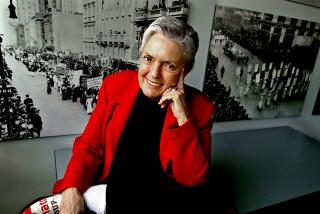Maggie Kuhn, 89; Iconoclastic Founder of Gray Panthers
- Share via
Maggie Kuhn, the outspoken, iconoclastic founder of the Gray Panthers, an international group that gives voice, hope and purpose to the aged, died Saturday in her Philadelphia home.
Miss Kuhn, who never married but boasted of relationships with married ministers and men 50 years her junior, was 89.
She had been suffering from arthritis and osteoporosis for years and died at home in her nurse’s arms, said her personal secretary, Sue Leary.
“She had always said she wanted to die before she reached the age of 90 and she was going to turn 90 in August. She kind of died her way,” said Laura Quinn, who helped Miss Kuhn write her autobiography, “No Stone Unturned: The Life and Times of Maggie Kuhn.”
Miss Kuhn was inspired 25 years ago to found a movement to combat ageism after being forced to retire.
She and four other women--only one of whom survives--were first called the Gray Panthers by a TV producer who said they were as militant as the Black Panthers.
Over the years, Miss Kuhn became the most visible of the founders, leading the party faithful in the formidable “Panther Growl” at their conventions.
The five women--all friends and all feeling a lack of fulfillment as they aged--started as an anti-Vietnam War protest group (a stand Miss Kuhn said made them popular with young people too). Soon they turned to other causes--sexism, racial injustice and age discrimination.
The group grew to 40,000 members in 32 states and six countries. Today, the only surviving co-founder is Polly Cuthbertson, also of Philadelphia.
As a girl, Miss Kuhn became interested in the feminist issues of the century, starting with the suffragette movement and moving into civil rights, labor, world peace and the environment.
An idealist throughout her life, she intended to stay in harness at the United Presbyterian Office in New York City beyond age 65. Instead she was told church policy required her retirement.
In a 1989 interview, she said the world unfairly portrays the old as weak.
“The first myth is that old age is a disease, a terrible disease that you never admit you’ve got, so you lie about your age,” she said. “Well, it’s not a disease--it’s a triumph. Because you’ve survived. Failure, disappointment, sickness, loss--you’re still here.”
She told the Associated Press in 1991, in an interview promoting her ruthlessly honest autobiography, that although she had chosen not to marry, she had lived a full and sexually active life, including a 15-year affair with a married minister and one of lesser duration with a man young enough to have been her grandson.
Sexuality is “the material of life and to deny it in old age is to deny life itself,” was her answer when asked why the book was so personal.
She also liked to boast that “the older you get the more outrageous you can be because you have nothing to lose.”
Most of the corporations she challenged over their retirement and promotion policies would concur.
Another favored response was her view of communities and homes for old people.
“Retirement communities are glorified playpens where wrinkled babies can be safe and out of the way. . . . There is little stimulation and people regress.”
To emphasize her point, she at one point opened her home to three housemates, ages 29 to 39.
In addition to her autobiography she wrote two other books, examining social justice and the place of the elderly in society. She also was the subject of documentaries: “Aging in America” and “Maggie Kuhn: Wrinkled Radical.”
As the Gray Panthers grew in number, Miss Kuhn found that its significance increased proportionately.
“The human life span has almost doubled since the turn of the century. The challenge is, what are you supposed to do with that when you’re supposed to retire halfway through life.”
Physically, Miss Kuhn looked more the grandmother than the gadfly. She was slight of build and seemingly demure until something or someone disturbed her.
On national television in 1974, she took “Tonight Show” host Johnny Carson to task for his “Aunt Blabby” impersonation. And she chided President Gerald R. Ford for calling her a young lady.
A memorial service is scheduled for April 29 at First Presbyterian Church in Philadelphia.
She once wrote that she would like her gravestone inscribed: “Here lies Maggie Kuhn under the only stone she left unturned.”
More to Read
Sign up for Essential California
The most important California stories and recommendations in your inbox every morning.
You may occasionally receive promotional content from the Los Angeles Times.










